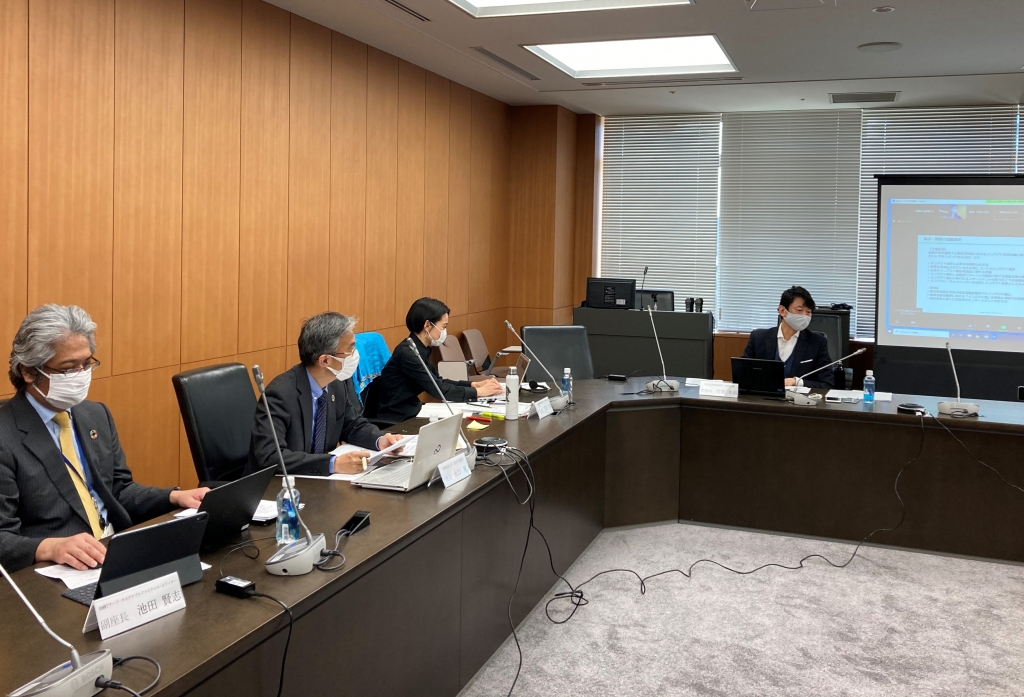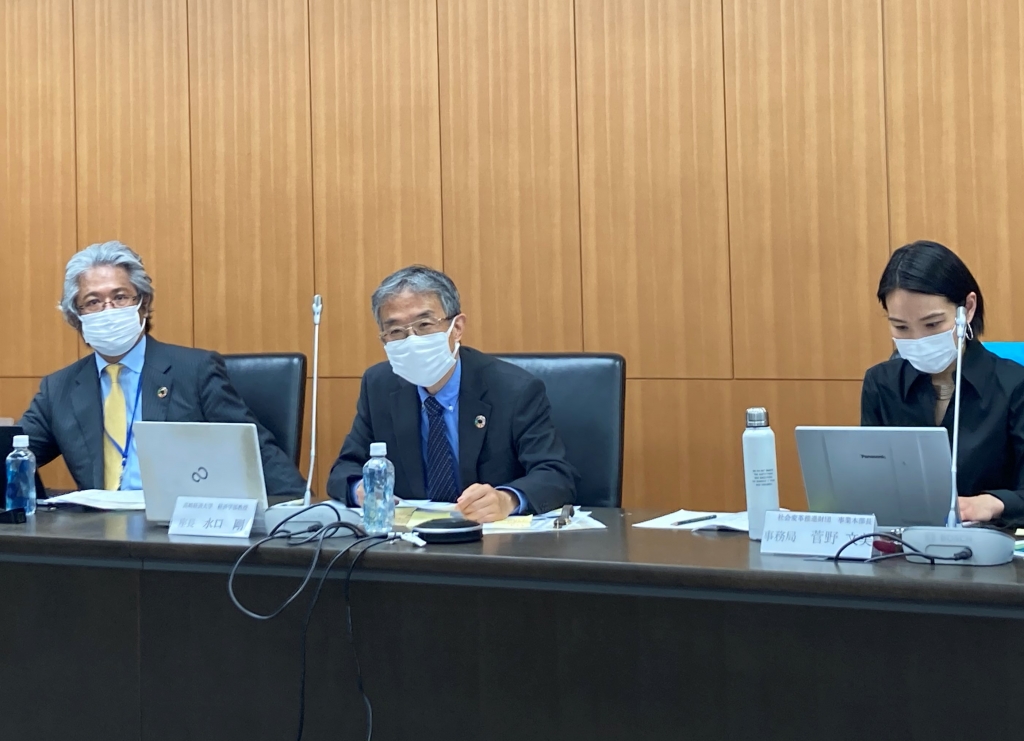News
News
The 5th meeting of "The Impact Investing Roundtable" was held online on Thursday, April 15, to deepen the understanding of impact investing among the leaders involved in the financial market and government administrations, and to discuss the significance and challenges of addressing social issues through impact investing in Japan and abroad.
Members of “Impact Investing Roundtable"
The 5th meeting focused on impact investing through listed equities and bonds, and upon sharing case studies, the members discussed the differences and relevance between ESG investing and impact investing, how the financial markets for listed equities and bonds are generating impact, and how to improve the quality of impact investing through listed equities and bonds as well as what is necessary in widening the impact investing market in the future.
After the opening remarks were delivered by Dr. Takeshi Mizuguchi, the Chairman of the Roundtable and the President of Takasaki City University of Economics, and Mr. Satoshi Ikeda, the Vice Chairman of the Roundtable and the Chief Sustainable Finance Officer of Financial Services Agency of Japan, Ms. Yuka Ogasawara, Impact Officer of Japan Social Innovation and Investment Foundation (SIIF), presented the overview and the current trends of the impact investing market through listed equities and bonds. Although unlisted equities are often the focus of impact investing discussions, topics like impact investing in listed equities and bonds being on the rise in recent years compared to other asset classes, and the amount of social bonds issued in Japan experiencing rapid growth, reaching 915 billion yen in FY2020 were introduced.
Next, Mr. Yutaka Naito, the Director of Sustainable Investment Promotion, BlackRock Japan Co., Ltd. and Ms. Chieko Iriyama, the Director of Equity Strategy for the same company explained about the video, "BlackRock Global Impact Fund", a listed equity impact fund by BlackRock by Quyen Tran, Director of Impact Investing, which was shared in advance. In this fund, the key impact investing criteria are materiality, additionality, and measurability, and portfolio companies must provide solutions to environmental and social issues that cannot be met by other companies or the government. In addition, in order to create impact in the companies they invest in, they conduct impact-oriented engagement, and in terms of the relationship between impact and return, the past performance of the fund was introduced, which showed that the group of impact companies were less expensive than the other companies, despite their higher growth rate. It was also explained that the fund incorporates as wide of a range of IMM's international frameworks as possible, such as SDGs, IMP, IRIS+, and IFC's Operational Principles for Impact Investing.
Mr. Yuichiro Hanyu, the Senior Fund Manager of Equity Management Department of Resona Asset Management Co., Ltd. then explained about Resona's newly established "Resona Local Impact Fund" targeting Japanese listed equities. This initiative, originating from the company's purpose, is aimed at "achieving a sustainable and livable Japanese society." As for why impact investing through listed companies is necessary and what the advantages compared to other asset classes are, he pointed out that the impact that can be created is large due to the size of the business, the scope of activities, and the abundance of resources. He also pointed out the value of democratization in the sense of delivering impact investing opportunities to a wide range of individual investors. Now concerning the question, "What is the intention of this impact investing?" he said that it is important for both the portfolio company and the fund manager to have a common intention, and that the emphasis is not only on the mission vision of the portfolio company but also on whether the intention, strategy and execution plan are well integrated. He also said that even if a company itself says that it is not "doing anything extraordinary for society," the value of engagement is to help them understand what kind of impact they have been bringing and can bring to society and to exchange ideas on how to additionally create their impact. Concerning the measuring and management their outcome, it was important to have potential to continuously and repeatedly identify and solve issues. He also mentioned that careful dialogue and engagement are essential to ensure that investees understand the significance of measurements.
Next, Mr. Kazutake Shimizu, the Manager of SDGs Finance Section of Debt Capital Market Department 3 of Daiwa Securities Co., Ltd. gave a presentation on SDGs bond structuring and its challenges. Mr. Shimizu explained that bonds are a more flexible and convenient means of financing compared to equity financing such as public stock offerings and bonds with stock acquisition rights and that there are three types of SDGs bonds: green/social/sustainability bonds with limited use of funds and sustainability link bonds (link bonds) with no restrictions on the use of funds but with coupons that fluctuate depending on the degree of achievement of the sustainability performance target (SPT). He also explained that the use of funds and reporting are determined based on ICMA's Green Bond Principles and Social Bond Principles. He also pointed out that investors sometimes question the point that the coupon which is the economic value will increase even further if the SPT is not achieved even though they will purchase the link bonds because they find them socially significant. He also explained that while, in the case of the green bonds with limited use of funds, the issuer's commitment to the overall goals of the company is unclear, in the case of the linked bonds, the funds are not necessarily used for projects that create environmental impact. He introduced the case of Takamatsu Construction Group as an example of a "sustainability-linked green bond" that covers both of these weaknesses, but he also introduced the fact that, at present, many green bonds with limited use of funds are issued.
With Mr. Kazutake Shimizu, Mr. Minoru Matsubara, the Executive Officer and General Manager of Responsible Investment Department of Resona Asset Management, Mr. Toshikazu Hayashi, the Chief Analyst of ESG Promotion Department of Nissay Asset Management, and Mr. Shunsuke Oshida, the General Manager of Credit Research Department of Manulife Investment Management Ltd. as our guests, the panel discussion was facilitated by Mr. Mizuguchi.
First, they discussed the difference between the engagement in ESG investment and the engagement in impact investing and the relationship between engagement and IMM. The difference between ESG engagement and impact engagement is "intention," and it was pointed out that the real appeal of impact investing is how one will match the corporate purpose and intention with the investor purpose and intention. It was also pointed out that the implementation of IMM is essential, but what is even more important is accountability and responsibility. Furthermore, it is necessary to measure the impact created through corporate activities as well as the effect of investor's engagement, but the latter is difficult to measure rigorously, so it was pointed out that the process should be disclosed and asset owners and investors should judge the validity of the process. With regard to IMM for bonds, it was pointed out that because in Japan dialogue with issuers has not progressed extensively and because the "review" under the ICMA Principles is voluntary, the degree of agreement with issuers on the purpose and intent of IMM at the time of issuance is important.
There was also an exchange of opinions on whether Japan needs to have a and regulations like the Sustainability Financial Disclosure Regulation (SFDR) in Europe which was introduced in this March. While the introduction of a regulation may promote some aspects of sustainability, holding on to the principle-based approach, it may be easier to promote innovation and integrity if it is possible to clearly understand what is being aimed at and what the objectives are. Also, these was an opinion that expressed a concern about the difficulties of practical procedures if they were to be introduced at this moment.
This was followed by a breakout session, in which the participants were divided into several groups to discuss "what is necessary for widening high-quality impact investing through listed equities and bonds in Japan" and "what should be done to stimulate investor demand."
Regarding the former question, it was pointed out that intention is still important for impact investing and that it is important that impact become a source of future corporate value. It is also pointed out that verification on the effects of impact on economic return is necessary. In order to ensure that, it was pointed out that the sharing of good practices is necessary.
With regard to the latter, it was pointed out that there is a need to understand individual investors, especially the need to create a mechanism that would allow funds to flow back from the elderly to the younger generation, as well as the importance of improving the quality of information disclosure and dissemination. It was also pointed out that there is a need to collect and disseminate information in English to connect with the global community and to explain Japan's uniqueness.
On the day of the meeting, 33 Roundtable members from the financial market, business, and industry sectors attended the meeting, and, about 100 observers participated including related ministries and others.
ーーーーーーーーーーーーーーーーーーーーーーーーーーーー
The next meeting is scheduled to be held on June 29, 2021.
For the Roundtable meeting, see below;
・First Roundtable(June 2020)
・Second Roundtable(September 2020)
・Third Roundtable(November 2020)
・Forth Roundtable(January 2021)
| List of speakers |
|---|
|
Satoshi Ikeda, Vice Chairman of the roundtable, the Chief Sustainable Finance Officer, Financial Services Agency Quyen Tran, Director of Impact Investing for BlackRock., BlackRock Yutaka Naito, Head of Japan Sustainable Investing Dept., BlackRock Japan Co. Ltd Chieko Iriyama, General Manager of the Equity Strategy Department, Investment Division, BlackRock Japan Co., Ltd. Yuichiro Hanyu, Senior Fund manager, Equity Investment Division, Resona Asset Management Kazushi Shimizu, Head of SDGs Finance, Debt Capital Markets Department(Ⅲ), Daiwa Securities Co. Ltd. Minoru Matsubara, Executive Officer of Responsible Investment Division, Resona Asset Management Toshikazu Hayashi, Chief Analyst, ESG Investment Promotion Department, Nissay Asset Management Corporation Shunsuke Oshida, Head of Credit Research, Manulife Investment Management (Japan) |


- News
- GSG-NAB Japan and Financial Services Agency of Japan co-hosted the 5th "Impact Investing Roundtable " on April 15.

